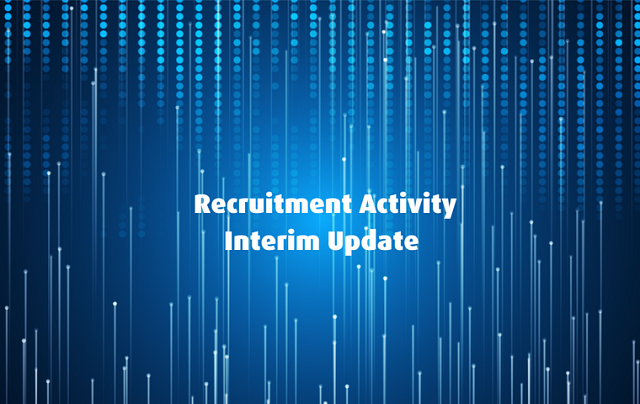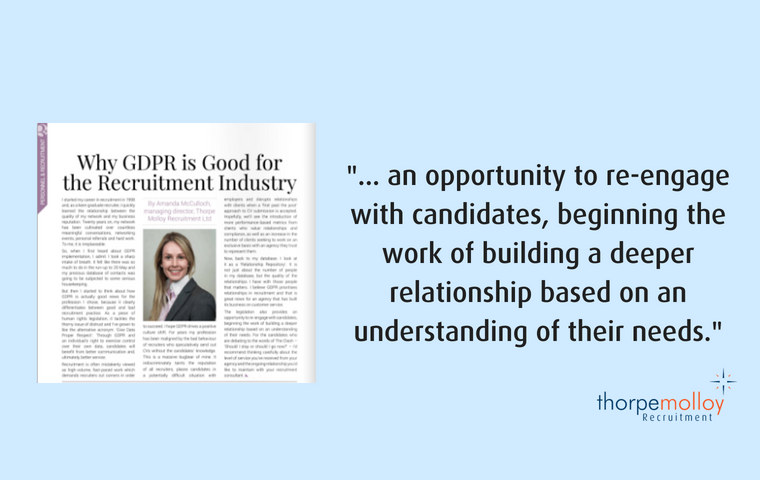Recruitment Activity Market Update
14th June 2018
The sense of cautious optimism seemed to stall at the turn of the year and I began to wonder if talk of an upturn was a little premature. But in the last few months I've become much more certain of improved market conditions as hiring activity across all our specialist areas continues to rise. So certain in fact that we recently added to our own team, hiring recruiters for Accountancy and Finance, HR, Office Personnel and Supply Chain.
Growing confidence is contagious, caught by passive candidates who are now assured enough to make a move. This sentiment is evidenced by increased candidate activity across all our specialisms including at the executive level. Leaders are emerging from a very intense few years where the rationale was to "sit tight", preferably in an organisation that could support development and ambition. Now, their mindset is shifting to thoughts of how they can expand their career options and enrich their experience in another organisation.
Another indicator of improved conditions is the type of recruitment we are responding to. Employers use temporary agency workers to manage uncertainty and provide short-term access to skills. This type of resourcing has gently declined in favour of temp-to-perm and permanent appointments.
The knock on effect is that fewer job seekers are now immediately available and, in conjunction with more job choice, employers are finding it harder to fill temporary roles. There's also been an increase in candidates withdrawing from the interview process and declining offers of employment, most notably in our Trades, Tech and IT specialism.
Another positive indicator from the last quarter is the rise in demand for internal recruiters, HR administrators and personnel logistics professionals. Larger HR teams are filling their vacancies internally, enabling career progression for those who have remained loyal throughout very challenging times for this profession. Where clients do come to market to back-fill a position long approval processes often protract the hiring process, thwarting meaningful knowledge transfer as there is no handover period.

By its nature, our Supply Chain and Commercial Contracts specialism is closest to the "upturn coalface" with professionals working in tendering, commercial negotiations, procurement and logistics. Since the beginning of the year there has been wide-spread engagement from companies at the top of the supply chain and this has had time to cascade downwards, increasing demand for contracts professionals to initiate and re-negotiate contracts. Logistics professionals were particularly hard hit during the downturn so the good news is that we expect them to be much more in demand into the second half of the year as contracts transition from negotiation, agreement and execution through to delivery.
Reflecting more buoyant commercial and private property markets our Legal specialism has worked on many more conveyancing roles this year. Retirement planning at smaller law firms is creating succession and partner opportunities and we also observe an increase in the appointment of senior counsel to industry roles.
As budget constraints in the oil and gas sector are somewhat relaxed more senior QHSE roles are coming to market. Many of these generalist appointments reinstate autonomous roles which were lost during the downturn. With passive candidates now turning much more active there is no shortage of candidates.
Conversely, for Accountancy and Finance, the mid to senior market has been sporadic, with the focus weighted towards more junior AP, AR and assistant roles. As always, there is high demand for qualified and actively studying part qualified accountants and chartered accountants newly qualified up to 5 years PQE.
Graduate jobs remain fairly thin on the ground but our Office Personnel, Accountancy and Finance as well as Supply Chain specialisms are increasingly working on cross-over roles.
Consistent across our specialisms, the rise in our recruitment activity is predominantly from clients in the energy sector. A sign of confidence noted by our Office Personnel team is the time taken for roles to transition from temp-to-perm shortening from months in 2017 to only a few weeks now.
Employers remain very particular in their hiring requirements, especially for C-suite appointments, continually seeking the "perfect" applicant. There's a real dichotomy here as a lack of flexibility often impedes diversity and dismisses candidate profiles that would be a great culture fit.
Employee engagement is a re-emerging business priority with investment in training, study support, reward strategies and internal communications (as evidenced by the mini comeback for compensation and benefits and communications specialists in larger oil service companies). We have even worked on a few event manager positions this year – a first since 2014! We all appreciate the productivity gains, cost efficiencies and reduced attrition that can be attributed to more engaged employees. But strategic employee engagement eludes many organisations and it is increasingly complicated by the breadth of generations in the workplace, evolving individual drivers and personal aspirations.
It would be crass to focus only on the more optimistic outlook as the spate of M&A activity, private equity investment and refinancing arrangements will likely lead to further rationalisation and job losses.










